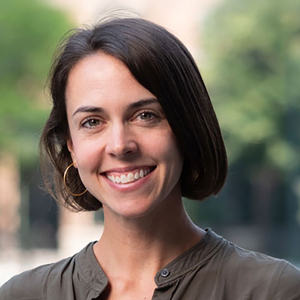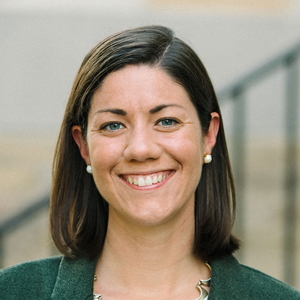
Enjoy presentations by this year’s recipients of the Phillip and Ruth Hettleman Prizes for Scholarly Achievement. The talks will provide an engaging look into these distinguished early career scholars’ work. The late Phillip Hettleman, a member of the Carolina class of 1921, and his wife Ruth established their prestigious named award in 1986 to recognize the achievements of outstanding junior faculty.
Check out all of the Hettleman Winner’s Presentations throughout the week:
- Het Talks: Sarah Cohen and Alex Zhukovitskiy
- Het Talks: Lindsey James and Angel Hsu
- Het Talks: Marissa Hall and Kathryn Leech
These are virtual, CLE Credit events.
Recorded Webinar:
2025 Hettleman Winners
 Marissa Hall, Health Behavior, Gillings School of Global Public Health
Marissa Hall, Health Behavior, Gillings School of Global Public Health
Hall, a member of the UNC Lineberger Comprehensive Cancer Center, is transforming how we understand and influence health behaviors through policy. Her research focuses on how product labeling, marketing, and availability shape consumer choices, especially around tobacco, alcohol, and food. She uses experimental methods to simulate real-world purchasing environments, and her work has demonstrated that pictorial warnings and front-of-package labels can significantly reduce the consumption of products like sugary drinks and cigarettes.
Currently, Hall leads NIH-funded studies on alcohol warning labels, exploring how stronger, more visible warnings can inform consumers about risks like cancer. Her research also addresses how labeling policies affect populations with limited English proficiency, a group often overlooked in public health communication.
 Kathryn Leech, School of Education
Kathryn Leech, School of Education
Leech investigates how everyday conversations between adults and children shape early language, literacy, and STEM development. Her work spans observational studies in authentic environments, experimental research to uncover causal mechanisms, and the design of innovative interventions that empower families to support their children’s learning.
Leech’s research reveals that the quality of adult-child interactions plays a more critical role in children’s development than the quantity. Her studies have shown that decontextualized language — references to past or future events and explanatory dialogue — are linked to stronger vocabulary, narrative skills, and scientific reasoning in young children. Her work is funded by an NSF CAREER award, with additional support from NIH and from partnerships funded by the Gates Foundation.
